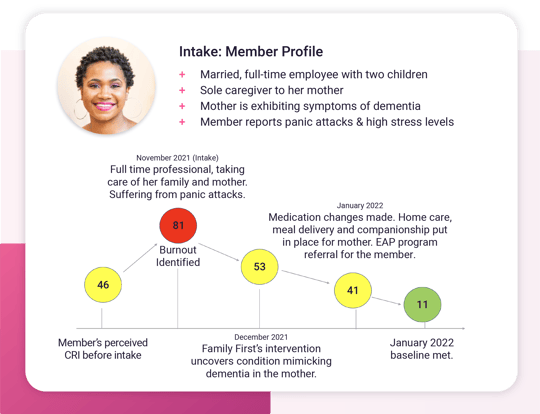AI, Data and Clinical Expertise can Predict and Prevent Caregiver Burnout
Family First has utilized decades of clinical experience combined with AI technology to create the Caregiver Risk Index. CRI is a predictive index that identifies individuals at risk from issues related to caregiving responsibilities.
Technology continues to fuel innovation throughout American industries, and data analytics has fundamentally changed how business leaders manage people. Companies have never had so much information to inform decision-making.
Family First's CRI allows business managers and medicare providers to utilize predictive data around caregivers' stress and mental health challenges. CRI uses Family First’s clinical expertise to identify underlying issues that caregivers are often unable to identify and articulate as the reason they are struggling. Most commonly, this is due to the overwhelming nature of their caregiving situation and not having experience of a similar situation before. The clinical knowledge and data from millions of caregiving cases are enhanced with AI technology to predict where staff who are caregivers are likely to need intervention support. By providing support in this method, Family First helps to manage the risk of stress and mental health conditions and prevent related absences from work or even employees leaving their jobs altogether. As the feedback below demonstrates:
“My Care Expert was absolutely wonderful - a kindred spirit who helped me so much! I am the caregiver and support for everyone. I had nowhere to turn when I myself needed help. Family First was such a gift. It was a godsend and kept me sane at a time when I was questioning whether or not I'd be able to continue working or if I'd have to take an unpaid leave of absence from work in order to handle my life issues, which would have been an incredible financial burden. The fact that the service is provided for free by my employer made it easier to remain working and let Family First set me on the right path with so many resources and support. It's so nice to know that Family First is there whenever I need them, and I've told everyone I know about my experience and encouraged them to get started with their own path with this service.”
The CRI can be combined with other initiatives such as employee surveys that can be used to understand the needs of your caregiving employees. This will help you identify what your company culture needs to provide to create a holistic solution of support.
 Family First’s Caregiver Risk Index Allows for Preventive Care
Family First’s Caregiver Risk Index Allows for Preventive Care
Caregiving is often overlooked as a determinant of an individual's health and well-being. In reality, the mental health impact, financial burdens, legal issues, and stressful family dynamics related to caregiving leads to burnout. Ultimately, caregiver burnout has a negative impact on individuals, families, businesses, and healthcare providers.
Family First has monitored the struggles caregivers experience when balancing a career, children, and life commitments through 30 years of clinical experience and white glove services. The findings support data from caregivers surveys and countless independent medical studies.
For instance, a study published in NCBI on Burnout Syndrome in informal family member caregivers of older adults with dementia concluded that those providing informal care suffer from emotional and physical stress. The results showed that Burnout Syndrome negatively affected caregivers quality of life and was associated with depressive and anxious symptoms.
The American Psychological Association conducted a 2020 study in which 32.9 percent of unpaid caregivers reported mental or behavioral health problems such as anxiety, depression, or substance use in the 30 days before the survey. The ASA study also found an alarming 30.7% percent of unpaid caregivers reported thinking seriously about suicide in the 30 days beforehand. That compares with a suicidal ideation rate of 3.6% in those not providing unpaid care for older adults.
Aging Population Results in More Working Caregivers
Harvard Business School Professor Joseph Fuller’s research found company leaders hugely underestimate the number of caregivers in their workforce and the resulting impact on finances. Because most employers do not track caregiving statistics amongst their employees, they often do not offer the supportive infrastructure and the right benefits to support this part of the workforce.
Caregiving responsibilities are increasing as the population ages, with Fuller’s study finding that 73% of all employees have some form of caregiving responsibility. Demands are even higher for the so-called Sandwich generation, those supporting both children and elderly parents.
How Family First's CRI Works
Family First’s expert care team analyzes data from millions of care cases to uncover gaps in care that other platforms are unable to identify. Technology and expertise enables Family First to ensure that caregivers have access to the clinical support and solutions they need.
The solution means employee caregivers receive the clinical support required to reduce stress and anxiety levels, returning to a more stable baseline where they have the time and space to concentrate on their careers.
Data and analytics are fueling progress in almost every industry. Now caregiving can also benefit from data and technology thanks to Family First’s Caregiver Risk Index.
The Benefits of Family First's CRI
Talent retention is vital for sustaining growth and profitability in a business. The Great Resignation during the Covid-19 Pandemic has shown the importance of providing a benefits package that appeals to employees. Without caregiving benefits companies risk a drop in productivity and a loss in knowledge and skill sets critical to business operations. A Harvard Business Review article Supporting Employee Caregivers Starts with Better Data shows U.S. businesses lose $35 billion annually from failing to attract, support, and retain these crucial workers.
Covid put caregiving in even more focus for workers with vulnerable relatives. A report published by Boston Consulting Group surveyed 14,100 full- or part-time employees who were also caregivers. The 14,100 respondents all worked for large companies and were asked about the support they have received from their employer, and if they had intention to leave their company. The results: caregivers - especially those caring for a young child or an adult - were almost twice as likely as non-caregivers to say they would leave their current employer within the next six months. As Fuller says in his report: "Firms can gain a competitive advantage by investing in a care culture,"
By providing support for caregivers as part of a benefits package you enhance the well-being of your staff, improve the vitality of your business and display understanding and empathy for the situation many workers are struggling with today.
For health plan providers and medicare, the predictive and preventive aspect of Family First CRI results in better early treatment reducing the severity of illnesses and returning the employee to a better-balanced life where they can cope with caregiving and work responsibilities. The result is a healthier and happier individual and family, with associated lower costs in medical bills and a healthier workforce/nation over the long term.
CRI provides an invaluable caregiving tool to assess the current risks of mental health problems for caregiving individuals. The assessment allows medical experts to identify solutions that help the caregiver and their family. Family First support means the caregiver can continue their career development and enjoy lower stress levels, resulting in a more balanced life. The feedback below is a good indication on the benefits of caregiver support:
“I enjoyed working with the Family First Care Expert. She took the time to listen to all my needs and help identify how she could help. She communicated with me throughout the tasks, she helped me and always kept me up to date. She would communicate with me to check on how I was doing and my progress. She was incredibly caring and also diligent to help me reach the help I needed in the care of my dad. She went above and beyond and I am extremely grateful. My dad has a C.N.A. caregiver to help take care of him so I can work, he was able to get an assigned visiting MD because I was not able to physically take him to doctor appointments. I was able to connect to resources for therapy to help me. The assistance was key to getting calls done and making consistent follow up until we had success. With my work schedule and caring for my dad, I was unable to stay consistent and diligent in follow ups. If Family First was not available I would have taken a leave of absence and continued to have struggled without support.”
Providing the Caregiving Benefits Your Organization Needs
Caregiving support is considered a key benefit for the modern workforce. Family First's survey of working caregivers shows 72.2 percent of respondents believe their employer could do more to help them, while 82 percent of respondents said that caregiving should be an essential employee benefit and placed on par with healthcare and dental insurance.
The majority (75.55%) of those surveyed cited access to clinical support from nurses and physicians as the support they would most like to receive.
Family First is the best all-round clinical solution utilizing mHealth technology, 30 years of clinical expertise, white glove services, and a predictive index fueled by AI and data to identify and supply help to caregivers when it is needed. No other solution can offer the same holistic service to provide real value to the lives of working caregivers.


